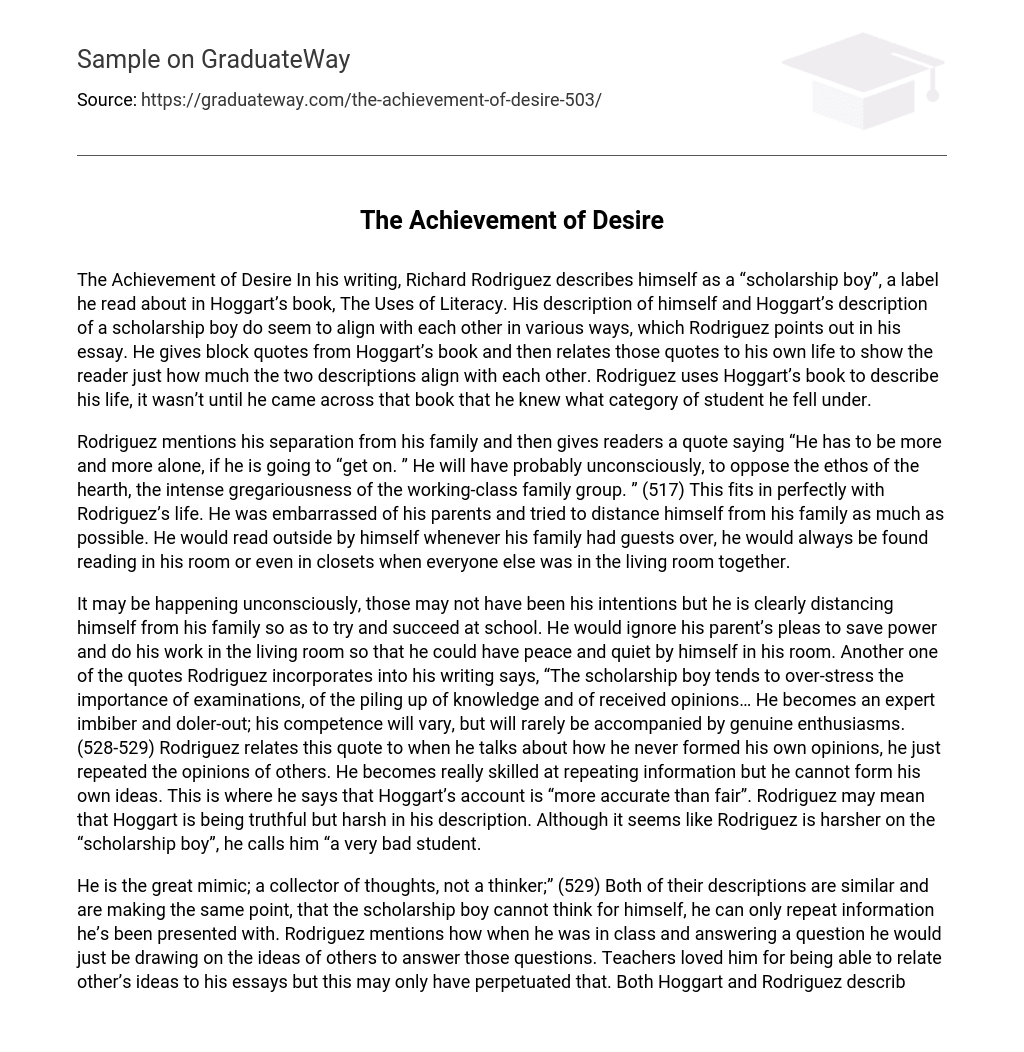The author, Richard Rodriguez, identifies himself as a “scholarship boy” in his writing, referring to a term he encountered in Hoggart’s book, The Uses of Literacy. Both Rodriguez’s self-description and Hoggart’s portrayal of a scholarship boy bear striking similarities, as noted by Rodriguez in his essay. He presents direct quotations from Hoggart’s book and connects them to his own experiences, illustrating the strong correlation between the two descriptions. Utilizing Hoggart’s book, Rodriguez effectively characterizes his life, as he only became aware of his student classification after encountering this literary work.
In his discussion, Rodriguez talks about his detachment from his family and cites a quote that asserts the necessity of isolation for success, along with an unconscious resistance to the values of close-knit families and strong communities commonly seen in working-class households (517). This quote mirrors Rodriguez’s own encounters perfectly. He experienced embarrassment towards his parents and actively tried to establish distance between them. Whenever visitors came over, he would occupy himself by reading alone outdoors. Regardless of everyone else congregating in the living room, he could always be found engrossed in a book in his bedroom or even hidden away in closets.
Without realizing it, he is creating a distance between himself and his family to excel in school. Despite his parents begging him otherwise, he opts to study in the living room for a tranquil environment instead of his own room. As mentioned by Rodriguez, “The scholarship boy tends to excessively emphasize the significance of exams, accumulating knowledge, and conforming to established beliefs. He becomes adept at absorbing information and dispensing it; although his proficiency may vary, genuine enthusiasm is seldom present” (528-529).
According to Rodriguez, he sees a connection between this quote and his inability to develop his own opinions. Instead, he merely regurgitates the viewpoints of others, becoming proficient in echoing information but incapable of generating his own ideas. Consequently, Rodriguez deems Hoggart’s portrayal as “more accurate than fair.” This implies that Hoggart’s description is truthful yet excessively critical. While it appears that Rodriguez is more critical of the “scholarship boy,” he declares him as “a very bad student.”
Both Hoggart and Rodriguez describe the scholarship boy as a great mimic, someone who collects thoughts rather than thinking for himself (529). They both agree that the scholarship boy can only regurgitate information and lacks the ability to generate original ideas. For instance, Rodriguez recounts how he used other people’s ideas in class discussions and essays, earning praise from teachers. However, this tendency only reinforced his dependence on others’ thoughts. In essence, these authors argue that the scholarship boy is limited to echoing the thoughts of others rather than formulating his own.
Rodriguez uses Hoggart’s book to identify himself as a student falling into a particular category. He quotes from The Uses of Literacy and connects those quotes to his own experiences, highlighting the striking resemblance between his life and the description of a scholarship boy. However, it is now incorrect to label Rodriguez as a scholarship boy since he is no longer a student; he writes his own works, indicating that he has finally gained the ability to express his own thoughts, which a scholarship boy lacks.





